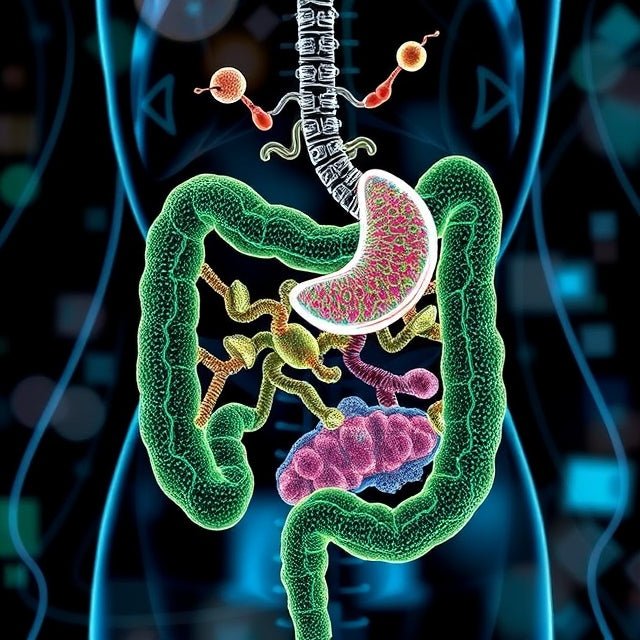
The Gut Microbiome: The Hidden Engine of Our Health
The human body is home to trillions of microorganisms, from bacteria and viruses to fungi and archaea, collectively known as the microbiome. Among these, the gut microbiome stands out as a crucial player in maintaining overall health. Located primarily in the intestines, the gut microbiome is composed of diverse microorganisms that interact with each other and with our body in complex and often essential ways. But why is the gut microbiome so important, and why should we be paying more attention to it, particularly through microbiome testing?
In this article, we will explore the structure and functions of the gut microbiome, its role in gut health, the importance of maintaining a balanced microbiome, and how microbiome testing can provide valuable insights into your digestive system and overall well-being.
What is the Gut Microbiome?
The gut microbiome refers to the community of microorganisms that inhabit the gastrointestinal (GI) tract, which includes the stomach, small intestine, and large intestine. It is estimated that the human gut microbiome contains around 100 trillion microbes, including bacteria, viruses, fungi, and single-celled organisms, each playing a distinct role in the body. The composition of this microbiome is unique to each individual, influenced by genetics, environment, diet, lifestyle, and even the mode of birth (vaginal delivery versus cesarean section).
The majority of these microorganisms are bacteria, with trillions residing in the colon. The gut microbiome also consists of viruses, bacteriophages (viruses that infect bacteria), and fungi, which together form a diverse ecosystem. This microbial ecosystem is essential for maintaining a balanced and healthy digestive system, and it extends its influence far beyond the gut itself, contributing to many aspects of overall health.
The Role of the Gut Microbiome in Gut Health
Gut health is more than just the absence of digestive issues; it encompasses a well-functioning digestive system that efficiently processes food, absorbs nutrients, and eliminates waste. The gut microbiome plays a crucial role in all of these functions.
-
Digestion and Nutrient Absorption: Many of the microorganisms in the gut help break down complex carbohydrates and fibers that our bodies cannot digest on their own. This process produces short-chain fatty acids (SCFAs) like butyrate, propionate, and acetate, which are important for maintaining the health of the gut lining and providing energy for our cells. These SCFAs are also known to help regulate the immune system and protect against inflammation.
-
Immune System Regulation: About 70% of the body’s immune system resides in the gut. The gut microbiome plays a vital role in educating and supporting the immune system. It helps in distinguishing between harmful pathogens and beneficial substances, thus preventing unnecessary immune reactions. A well-balanced gut microbiome can help protect against autoimmune diseases, allergies, and chronic inflammatory conditions.
-
Gut Barrier Integrity: The gut is lined with a layer of epithelial cells that form a barrier to protect the body from harmful microorganisms and toxins. The microbiome contributes to maintaining the integrity of this gut barrier by supporting the production of mucus and regulating the function of tight junctions between cells. A disrupted gut microbiome can lead to a leaky gut, where harmful substances enter the bloodstream, potentially causing inflammation and increasing the risk of diseases like irritable bowel syndrome (IBS), Crohn’s disease, and even metabolic disorders.
-
Gut-Brain Axis: There is a complex communication system between the gut and the brain known as the gut-brain axis. The gut microbiome has been shown to influence mood, behavior, and mental health through the production of neurotransmitters like serotonin and gamma-aminobutyric acid (GABA). Imbalances in the gut microbiome have been linked to conditions such as anxiety, depression, and even neurodegenerative diseases like Parkinson’s.
-
Metabolism and Weight Regulation: The gut microbiome is intricately involved in metabolism. It helps regulate fat storage, energy production, and even insulin sensitivity. Disruptions in the microbiome have been associated with obesity, type 2 diabetes, and metabolic syndrome. Some gut bacteria are known to extract more energy from food, contributing to weight gain, while others may influence how the body processes and stores fat.
-
Protection Against Pathogens: A healthy gut microbiome competes with harmful pathogens for space and resources, acting as a first line of defense. Beneficial bacteria, such as Lactobacillus and Bifidobacterium, can produce substances that inhibit the growth of harmful microbes, reducing the risk of infections and diseases.
The Importance of a Balanced Gut Microbiome
Just like any ecosystem, the gut microbiome relies on balance. A healthy microbiome is diverse, with a wide variety of microorganisms performing specialized tasks. However, modern lifestyles—especially poor diets, high levels of stress, antibiotics, and environmental toxins—can disrupt this balance, leading to dysbiosis, an imbalance in the microbiome. Dysbiosis has been linked to a wide array of health issues, including digestive problems, immune system dysfunction, metabolic disorders, and even mental health conditions.
The overuse of antibiotics is particularly concerning because it can wipe out both harmful and beneficial bacteria in the gut, making it harder for the microbiome to recover. High-sugar, high-fat diets can promote the growth of harmful bacteria, while a lack of fiber can starve beneficial gut microbes. Stress, lack of sleep, and exposure to toxins further exacerbate the problem.
In contrast, maintaining a balanced gut microbiome involves supporting the growth of beneficial microorganisms through a healthy diet, adequate sleep, stress management, and the occasional use of probiotics or prebiotics. A balanced microbiome not only supports digestive health but also enhances immunity, mood regulation, and metabolic function.
Why Microbiome Testing is Crucial
Given the growing body of research on the importance of the gut microbiome, it’s clear that understanding your own microbiome can have significant benefits. This is where microbiome testing comes in. Microbiome testing is a process by which you can analyze the composition of the microorganisms residing in your gut. This test provides a snapshot of the types of bacteria, viruses, fungi, and other microbes present in your digestive system.
There are several compelling reasons to consider microbiome testing:
-
Personalized Insights into Gut Health: A microbiome test allows you to understand the specific composition of your gut microbiome. It identifies whether you have a healthy balance of beneficial bacteria, or if there are imbalances, such as an overgrowth of harmful bacteria or a deficiency of essential species. This information can guide you in making informed dietary and lifestyle changes to support your gut health.
-
Identifying Dysbiosis: Dysbiosis can be subtle, with symptoms like bloating, fatigue, irregular bowel movements, or skin issues. Microbiome testing can reveal the underlying imbalances in the gut that may not be obvious but could be affecting your overall health. Identifying dysbiosis early allows you to take proactive steps to restore balance.
-
Optimizing Diet and Lifestyle: Different people may benefit from different diets depending on their microbiome composition. For instance, some people may have a microbiome that thrives on a high-fiber, plant-based diet, while others may need more protein or fat to support healthy bacteria. Microbiome testing can provide tailored dietary recommendations, helping you make smarter choices that support a healthier gut.
-
Assessing the Impact of Probiotics and Prebiotics: If you're taking probiotics or prebiotics, a microbiome test can help assess whether these supplements are having a positive impact. Some individuals may respond better to certain strains of probiotics, while others may not benefit at all. By testing your microbiome, you can determine which probiotics or prebiotics are best suited for your individual needs.
-
Preventing Chronic Diseases: Imbalances in the gut microbiome have been linked to chronic conditions such as inflammatory bowel disease (IBD), IBS, obesity, diabetes, and even cardiovascular disease. Microbiome testing can provide early indicators of risk for these conditions, allowing you to take preventive measures before symptoms develop.
-
Monitoring and Improving Mental Health: As research continues to unveil the connection between the gut microbiome and mental health, microbiome testing may offer insights into how your gut health impacts mood, stress resilience, and cognitive function. Imbalances in the gut microbiome have been associated with anxiety, depression, and other mood disorders. Testing can provide valuable data to help address these concerns holistically.
-
Tracking Changes Over Time: The gut microbiome is dynamic, meaning it changes over time based on various factors such as diet, environment, medications, and stress. Microbiome testing allows you to track these changes and adjust your approach to gut health accordingly.
How to Test Your Gut Microbiome
Microbiome testing is relatively easy and non-invasive. Most tests involve collecting a stool sample, which is then analyzed in a laboratory to identify the types and quantities of microorganisms present. Some companies offer home testing kits, where you collect the sample and send it to a lab for analysis. The results are typically available online within a few weeks, and you can review the breakdown of your microbiome, along with personalized recommendations.
When choosing a microbiome testing kit, it’s important to look for one that offers detailed analysis and provides useful insights, just like the InnerBuddies gut microbiome testkit. Many testing kits provide a comprehensive report that outlines the diversity of your microbiome, highlights imbalances, and offers specific recommendations for improving your gut health.
Conclusion
The gut microbiome is an essential aspect of human health, influencing digestion, metabolism, immunity, and even mental well-being. Understanding the complex and delicate balance of microorganisms that reside in your digestive system is key to maintaining optimal gut health. Dysbiosis—an imbalance in the gut microbiome—can lead to a host of health problems, but microbiome testing offers a powerful tool for identifying and addressing these issues.
By testing your gut microbiome, you gain valuable insights that can help you personalize your diet, improve digestion, enhance immune function, and potentially prevent or manage chronic conditions. As science continues to uncover the deep connections between the gut and overall health, taking steps to nurture a healthy microbiome has never been more important.
If you're serious about improving your gut health, microbiome testing could be the first step towards a better, more balanced life. Whether you're dealing with digestive issues, want to optimize your immune system, or simply feel that something is off, understanding your gut microbiome can offer the answers you need.

